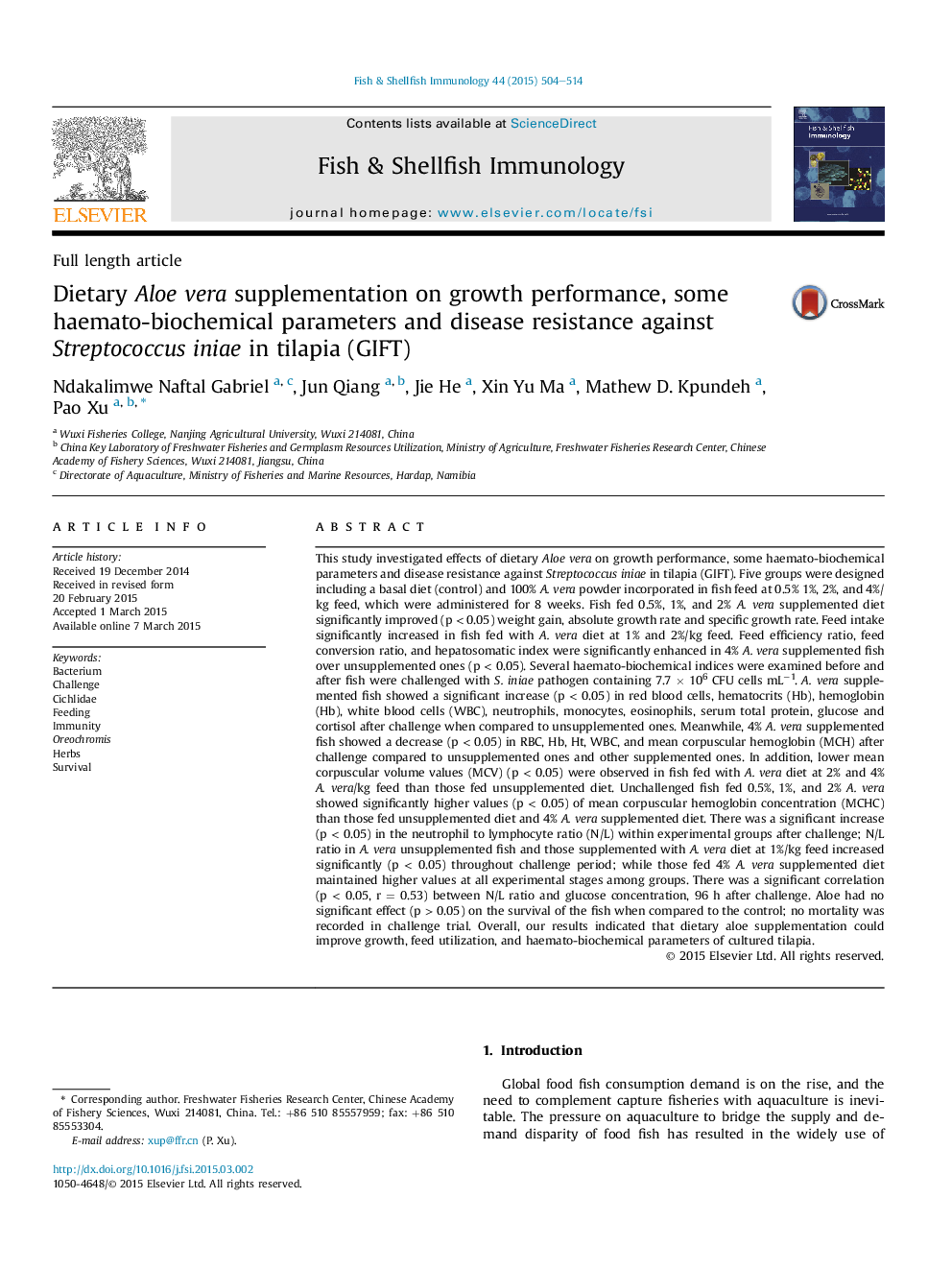| کد مقاله | کد نشریه | سال انتشار | مقاله انگلیسی | نسخه تمام متن |
|---|---|---|---|---|
| 2431230 | 1106749 | 2015 | 11 صفحه PDF | دانلود رایگان |

• Aloe vera supplemented diets improved growth parameters of GIFT tilapia.
• Aloe vera supplemented diet improved feed utilization parameters of GIFT tilapia.
• Aloe vera supplemented diets enhanced haemato-biochemical indices of GIFT tilapia.
• 4% dietary A. vera inclusion level caused anemia condition in GIFT tilapia.
This study investigated effects of dietary Aloe vera on growth performance, some haemato-biochemical parameters and disease resistance against Streptococcus iniae in tilapia (GIFT). Five groups were designed including a basal diet (control) and 100% A. vera powder incorporated in fish feed at 0.5% 1%, 2%, and 4%/kg feed, which were administered for 8 weeks. Fish fed 0.5%, 1%, and 2% A. vera supplemented diet significantly improved (p < 0.05) weight gain, absolute growth rate and specific growth rate. Feed intake significantly increased in fish fed with A. vera diet at 1% and 2%/kg feed. Feed efficiency ratio, feed conversion ratio, and hepatosomatic index were significantly enhanced in 4% A. vera supplemented fish over unsupplemented ones (p < 0.05). Several haemato-biochemical indices were examined before and after fish were challenged with S. iniae pathogen containing 7.7 × 106 CFU cells mL−1. A. vera supplemented fish showed a significant increase (p < 0.05) in red blood cells, hematocrits (Hb), hemoglobin (Hb), white blood cells (WBC), neutrophils, monocytes, eosinophils, serum total protein, glucose and cortisol after challenge when compared to unsupplemented ones. Meanwhile, 4% A. vera supplemented fish showed a decrease (p < 0.05) in RBC, Hb, Ht, WBC, and mean corpuscular hemoglobin (MCH) after challenge compared to unsupplemented ones and other supplemented ones. In addition, lower mean corpuscular volume values (MCV) (p < 0.05) were observed in fish fed with A. vera diet at 2% and 4% A. vera/kg feed than those fed unsupplemented diet. Unchallenged fish fed 0.5%, 1%, and 2% A. vera showed significantly higher values (p < 0.05) of mean corpuscular hemoglobin concentration (MCHC) than those fed unsupplemented diet and 4% A. vera supplemented diet. There was a significant increase (p < 0.05) in the neutrophil to lymphocyte ratio (N/L) within experimental groups after challenge; N/L ratio in A. vera unsupplemented fish and those supplemented with A. vera diet at 1%/kg feed increased significantly (p < 0.05) throughout challenge period; while those fed 4% A. vera supplemented diet maintained higher values at all experimental stages among groups. There was a significant correlation (p < 0.05, r = 0.53) between N/L ratio and glucose concentration, 96 h after challenge. Aloe had no significant effect (p > 0.05) on the survival of the fish when compared to the control; no mortality was recorded in challenge trial. Overall, our results indicated that dietary aloe supplementation could improve growth, feed utilization, and haemato-biochemical parameters of cultured tilapia.
Journal: Fish & Shellfish Immunology - Volume 44, Issue 2, June 2015, Pages 504–514